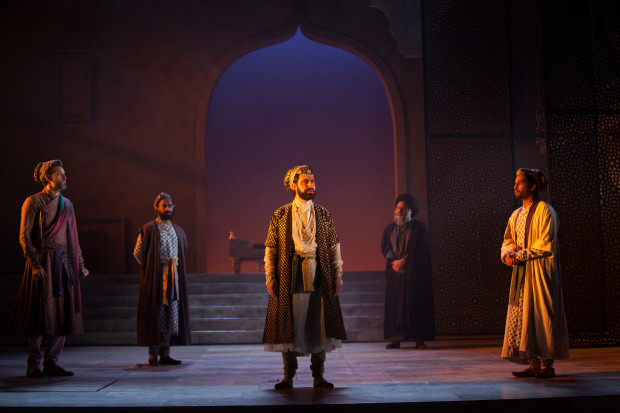You have no items in your cart. Want to get some nice things?
Go shopping
I was thinking, on my way to the theatre, of the Taj Mahal. Odd, perhaps, but the train of thought that led me to it was not difficult to guess at: it would feature in the performance I was to see, and so played on my mind beforehand. There it hung before my eyes, shimmering in the Agra-like temperatures of the overcrowded Tube carriage. A monument of love. A beautiful, moon-pale mausoleum built by one nameless Emperor for his equally misremembered wife. Shelley’s lines come to mind here: “‘Look on my works, ye Mighty, and despair!’/Nothing beside remains.” For me, at least – Joe Public on the Jubilee Line – the creation of the great Taj Mahal has been boiled down to the single, anecdotal act of love, a love without names, without context, without cause. That struck me as fairly Ozymandian.
The National Theatre’s current production, Dara, the story of a seventeenth-century Mughal power struggle, served to remedy my ignorance, supplying me with the long-forgotten context of this act of love, and the numerous bloodied acts of hate that followed it. It is our eponymous hero’s father who built the Taj Mahal for his third wife and, true to such large-scale gestures, he appears to us in Tanya Ronder’s adaptation of Shahid Nadeem’s play as a man of cartoonish extremes. He drives one son – Aurangzeb – away, and draws Dara, the other, closer; later, the two men fight for the Mughal Empire just as they once vied for their father’s affections.
Dara, a Sufi poet with an intellectual interest in other religions, is soon defeated by his bribing brother and accused of apostasy – and it is this court scene which gives the play its heart. What has come before feels like mere filling-in. The zig-zagging between settings and decades, the introduction of characters by subtitles as they enter: all this appears to be the cautiousness of a director who is uncertain that the plot will properly engage its audience. There are moments, therefore, when the action feels like exposition and the characters seem distinctly one-dimensional, hurrying to supply us with the story thus far. But when we get beyond that, and the pace slows for long enough to allow the scenes some ventilation, the play becomes something rather special.
Zubin Varla lends pathos to Dara, a man who sees his trial for the charade it is (his is the wonderful line: “The rest is ritual”). He is supported by Sargon Yelda as a chillingly remorseless Aurangzeb, closed-minded until the last, and a pair of impassioned sisters, played affectingly by Nathalie Armin and Anneika Rose. Indeed, the entire cast deserves praise: the actors slip convincingly between scenes of intimacy and those of sweeping epic, lifting the script in weak moments and savouring it in moments of strength. And the central court scene falls decidedly in the latter camp.
There is a concern reiterated in the programme by director Nadia Fall and writer Tanya Ronder, and again by Anwar Akhtar, director of thesamosa.co.uk, that the pertinence of the play would not be understood. And yet it can hardly be misunderstood, it is conveyed so loudly and so often. The liberalism of the martyred Dara is the play’s focal point, and his interest in Hinduism, Christianity and incipient Sikhism is pitted in stark counterpoint to the narrow-mindedness of the mullahs who try him. He espouses religious tolerance even as this tolerance condemns him to death; “my humanness,” he says to his prosecutor, “is shared with anyone and everyone”. In a time when tolerance has come under public scrutiny, this message (and the martyrdom of the man who conveys it to us) could not have greater resonance.
A word on Katrina Lindsay’s set, which – through clean lines and uncluttered open spaces – tempers the hammerings of the characters, a marbled platform for the melodramas of these warring princes. The lavishness of the costumes is also worthy of note, along with the haunting between-scenes music, under Niraj Chag’s direction.
There is certainly much to admire, not least the play’s slick ability to entertain and educate about such a significant chapter in Mughal history. And if, at times, the messages are too loud, the hagiography too insistent, and the revenge too hammy (“Is this a watermelon?”, the erstwhile Emperor asks, holding a box containing his son’s head. “I used to call Dara my watermelon.”), all is forgiven for the moments of pathos and edification to be found here.
From his prison cell, the elderly Emperor laments that he can no longer see his creation, the Taj Mahal, that enduring symbol of his earlier power and long-dead love. The Taj Mahal, which stayed with me all evening, has not escaped criticism – “Marble, I perceive, covers a multitude of sins,” Aldous Huxley once wrote of it – but it is eloquent and impressive and important nonetheless. The same might be said of this play describing the fate of the great monument’s creator.
Dara continues at the National Theatre until April 4.

About Xenobe Purvis
Xenobe is a writer and a literary research assistant. Her work has appeared in the Telegraph, City AM, Asian Art Newspaper and So it Goes Magazine, and her first novel is represented by Peters Fraser & Dunlop. She and her sister curate an art and culture website with a Japanese focus: nomikomu.com.




